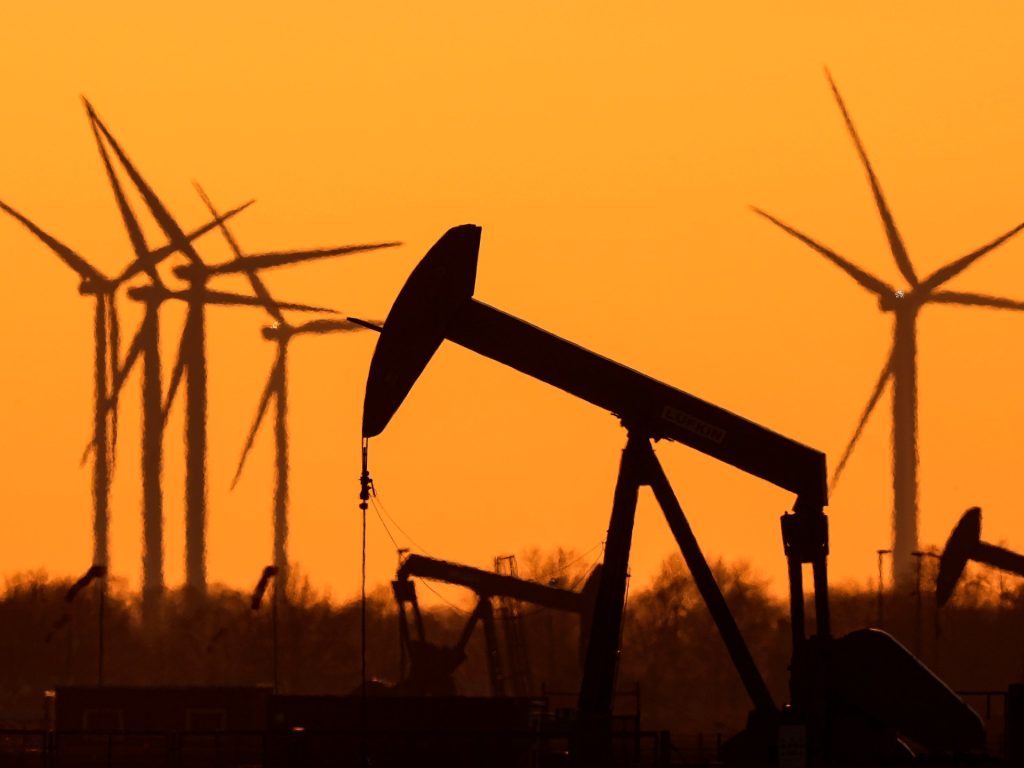A group of African countries is set to launch a bank to fund oil and gas projects amid growing reluctance by Western institutions to further invest in fossil fuels.
The long-planned “Africa Energy Bank” that is expected to take off soon was announced last June as a joint initiative by the African Export-Import Bank (Afreximbank) and the African Petroleum Producers’ Organization (APPO) – a group of 18 oil-exporting nations.
The bank aims to lift growth by boosting Africa’s energy supply. Its founders consider it a lifeline in a continent rich with natural resources, but where millions of people still lack access to electricity.
However, climate activists have questioned the logic of doubling down on fossil fuels.
In addition, oil and gas projects built today have a high probability of becoming unusable “stranded assets”, leading to costly debt on countries’ balance sheets in the future as the world transitions to low-carbon alternatives.
To provide for the material power needs of Africans while also protecting the planet, experts say a balance is needed.
![Climate activists hold placards as they demonstrate, calling for climate justice resistance against oil and gas drilling off the South African coastlines [File: Esa Alexander/Reuters]](https://www.aljazeera.com/wp-content/uploads/2025/02/2023-12-09T110949Z_1614740602_RC2NT4ABYPXR_RTRMADP_3_CLIMATE-CHANGE-SAFRICA-PROTESTS-1739891834.jpg?w=770&resize=770%2C538)
Caught between a rock and a hard place
Under the 2015 Paris Agreement, hundreds of countries pledged to hold global temperatures to below 2 degrees Celsius (3.6 degrees Fahrenheit) above pre-industrial levels. Since then, governments and companies – including in Africa – have faced increased pressure to reduce their reliance on fossil fuels.
The World Bank stopped financing oil and gas extraction in 2019. In 2022, Shell suspended marine exploration activity off the coast of South Africa after a High Court ordered it to pause work due to successful legal challenges from environmental campaigners.
At the time, Happy Khambule, a senior campaigner for Greenpeace Africa, said, “We must do everything we can to undo the destructive colonial legacy of extractivism, until we live in a world where people and the planet come before the profits of toxic fossil fuel companies.”
For his part, Omar Farouk Ibrahim, secretary-general of APPO, has said there is a “need to strike the right balance between the imperatives of climate change mitigation and the need to avoid social upheaval that could result from difficult economic and financial conditions in Africa”.
Indeed, Africa’s energy needs are immense.
The number of sub-Saharan Africans without access to electricity has risen in recent years. As population growth outpaced new energy supply in 2023, 600 million people (43 percent of the continent) were left in the dark, according to the International Energy Agency.
While estimates vary, electricity supply would need to increase fivefold to support large-scale industrial activity and help lift the majority of Africans – one-third of whom live on less than $1.90 a day – out of poverty.
On a per capita basis, Africa has the lowest level of modern energy usage in the world. At an economy-wide level, it also lags behind. Globally, manufacturing makes up 42.2 percent of total power consumption. In Africa, it’s just 16.8 percent.
APPO head Ibrahim says the Africa Energy Bank is the result of Western countries’ “abandon[ing] hydrocarbons” so that “the leaders of the continent have no choice but to look within to raise the required funds to sustain and grow the [energy] industry”.
![Employees drive past Africa's largest methanol plant at Punta Europa, in Equatorial Guineac [File: Pascal Fletcher/Reuters]](https://www.aljazeera.com/wp-content/uploads/2025/02/2014-03-10T120000Z_182807573_GM1EA3A1FIM01_RTRMADP_3_EQUATORIAL-IMAGE-1739891794.jpg?w=770&resize=770%2C468)
The Africa Energy Bank will be headquartered in Abuja, Nigeria’s capital.
On February 11, Nigeria’s Minister of State for Petroleum Resources Heineken Lokpobiri told reporters that “the building is ready, and we are only putting finishing touches to it, by the end of this quarter [end of March], this bank will take off.”
Countries involved in the Africa Energy Bank include Nigeria, Angola and Libya, among others. Planned projects are expected to range from offshore oil exploration to new gas-fired power plants.
Each country has pledged $83m and to raise a total amount of $1.5bn. That will be complemented by $14bn from the Afreximbank, a trade credit organisation.
Over the next five years, Lokpobiri said that the Africa Energy Bank is hoping to secure $120bn in assets. Additional funding will likely come from sovereign wealth funds, commodity traders and international banks interested in acquiring equity.
Africa’s context is ‘different’
Many African leaders recognise the need for rapid industrial development and balk at restrictions from Western financial backers, whose rules increasingly bar them from traditional energy projects.
Arkebe Oqubay, a former adviser to Ethiopia’s Prime Minister Abiy Ahmed, insists that “Africa’s context is totally different from elsewhere because its economic resources have not been fully developed. At the same time, it’s made a minimal contribution to climate change.”
Africa is responsible for just 4 percent of global carbon emissions and even less on a historical basis. It also suffers disproportionately from the effects of extreme weather events.
“The moral imperative to cut emissions is not as present in Africa,” said Oqubay.
He told Al Jazeera that, “[these] are countries at a development stage where you cannot suddenly move into the green transition … You cannot just say funding is cut and they cannot commit to oil and gas”.
The African Energy Chamber, an advocacy group, has also argued that Africa has a “sovereign right” to develop its natural resources, which, according to the group, includes 125 billion barrels of oil and 620 trillion cubic feet of natural gas.
“Until [renewable energy] funding becomes more readily available, African countries are entitled to expand their oil and gas capabilities … and the international community does not have the right to say we cannot do this,” said Oqubay.
“But to be clear, fossil fuels are not the future,” he said.
‘Huge’ renewable energy potential
Africa’s energy shortages are a “development constraint”, said Fadhel Kaboub, an associate professor of economics at Denison University in the United States. Africa’s subdued power sector limits the production of fertiliser, steel and cement – hallmarks of economic development.
The continent’s inability to industrialise has exacerbated global growth divergence.
From 2014 to 2024, gross domestic product (GDP) per capita in sub-Saharan Africa dropped by more than 10 percent (from $1,936 to $1,700). Over the same period, global GDP per capita rose by 15 percent.
“To climb the development ladder, the continent needs more energy,” Kaboub said. “But the best way forward isn’t to double down on fossil fuels. And boosting oil and gas exports as an end, in itself, is what Afrexim is pushing for.”
Instead, he believes that Africa should leverage its remaining fossil fuel infrastructure to build out its “huge” renewable energy potential. Africa is endowed with solar, wind and geothermal resources, as well as the critical minerals needed for green technologies.
According to the International Renewable Energy Agency, Africa’s potential to generate renewable energy from existing technologies, accounting for current costs, is 1,000 times greater than the projected demand for electricity in 2040.
![A worker walks between solar panels at Centragrid power plant in Nyabira, Zimbabwe [File: Philimon Bulawayo/Reuters]](https://www.aljazeera.com/wp-content/uploads/2025/02/2020-06-23T095051Z_1846088387_RC2XEH9RCU7P_RTRMADP_3_ZIMBABWE-POWER-CENTRAGRID-1739891807.jpg?w=770&resize=770%2C1017)
“Of course, there are constraints to realising Africa’s renewable energy capacity. But cost is not one of them,” said Kaboub, referring to reports which state that most new wind and solar projects are cheaper to run than their fossil fuel counterparts.
Instead, he contends that “debt is the pressure point not to change tack”.
Almost 60 percent of countries in sub-Saharan Africa are in debt distress, according to the World Bank. “For oil producers on the continent, economic activity mainly consists of exporting fossil fuels to stay on top of debt repayments,” said Kaboub.
He suggested that, by providing oil and gas for other countries’ industrial processes, African governments are engaged in “economic entrapment”.
“Industrial growth requires economies of scale [cost savings derived from high levels of production],” said Kaboub. “Africa needs regional development plans where national resources are complemented and built out across countries … it doesn’t need more siloed oil and gas projects.”
In his view, development banks are failing to present a long-term economic vision for the continent. “And the green industrial revolution, where renewable energies power domestic manufacturing, could be that strategy,” he said.
“Or we can continue to focus on raw material export activity and stay stuck in the resource trap.”








